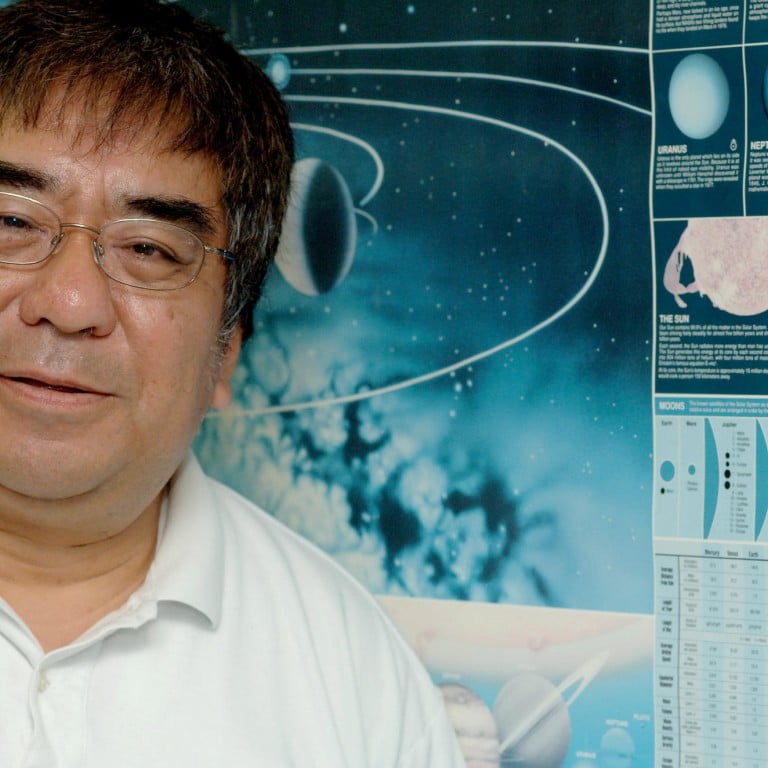
We come from stardust, says HKU's Professor Sun Kwok
Hong Kong professor to share his stellar views on the universe at a conference that will delve deep into the mysteries of the emergence of life
When astronomers, scientists and geologists from around the world meet in Japan next month to discuss the emergence of life on earth and in the universe, Hong Kong's Professor Sun Kwok will give the opening address.
"There are lots of new and unexpected things happening in this field, probably more so than in other scientific fields," says Kwok, chair professor of physics and dean of science at the University of Hong Kong.
Origins 2014 will bring together scientists from the International Society for the Study of the Origin of Life and the International Astrobiology Society and Bio-astronomy (Commission 51) in Nara from July 6-11.
Astrobiology is still a fairly new field and is all about the search for life on solar system bodies (think Mars, Europa and Titan) and the search for planets, especially potentially habitable ones. And the International Astronomical Union's Commission 51 is at the cutting edge. Kwok has been the commission's vice-president since 2012.
"We are interested in the study of comets, asteroids, meteoroids, planetary satellites in the solar system that may have implications on life," Kwok says.
While the bio-astronomers are largely astrologers and planetary scientists, the Origin of Life folk are mostly chemists and biologists. Not so long ago these two groups barely acknowledged each other, let alone met to share findings. But such is the pace of discovery that there is much that they can learn from each other about how life began on our planet. This is the second conference in three years.
Kwok's own research is focused on the area where the two disciplines overlap. His opening address - Organic Compounds in Circumstellar and Interstellar Environments - will outline the discoveries that have earned him a solid reputation.
The basic premise of his findings are thus: in the last stages of the life of a star - say the last 20,000 years of its five billion years - it begins to make complex organics and eject them into the galaxy. In a paper in in 2004, he and colleague Zhang Yong proposed that these complex organic compounds, the building blocks of life, reached the earth - and other planets - as stardust.
That paper stirred up the scientific community and put a big question mark over the assumption that earth had managed to create life all on its own. He has followed it up with more research, attempting to be more precise about what kinds of organics are there. And it was all done by pointing a telescope mounted on a satellite at a star and analysing the spectrum.
"Twenty years ago if you had raised the possibility that life came to earth from elsewhere people would have thought you were crazy, but now we have evidence. Even now we have 30,000 tonnes of stardust reaching earth every year and before the rate was much higher," Kwok says.
He has pulled together his findings and those of his peers in an accessible book - - which was published last year. And this will be the focus of his Japan talk.
"The most significant things about our discovery is that stars are common - and we are talking about ordinary stars, not some exotic peculiar things," Kwok says. "If they manufacture complex organics and spread it everywhere and if the universal process of life is the same, then life ought to have happened elsewhere as it did on earth. Add to this the discovery of other planets, and it's very exciting."
He expects the Origins of Life group to be most interested in what kind of chemicals are being produced by stars. That group has a longer history than the bio-astronomers, but the newcomers are making fast progress. While the Origins folk rely largely on theoretical studies, the bio-astronomers are fuelled by a steady stream of new discoveries - chief of which was the discovery of more than 1,000 planets in the past several years. Most of this is thanks to Nasa's Kepler Space Telescope that has been regularly reporting the discovery of new, possibly habitable, planets.
Other exciting developments in bio-astronomy include the discovery of meteoroids that contain plenty of biological material. Some have been found to have more than 100 amino acids, far more than the 20 that living organisms on earth have.
"Astronomy is the oldest science and its also the newest science because so much progress is being made and we really don't know that much," Kwok says.

